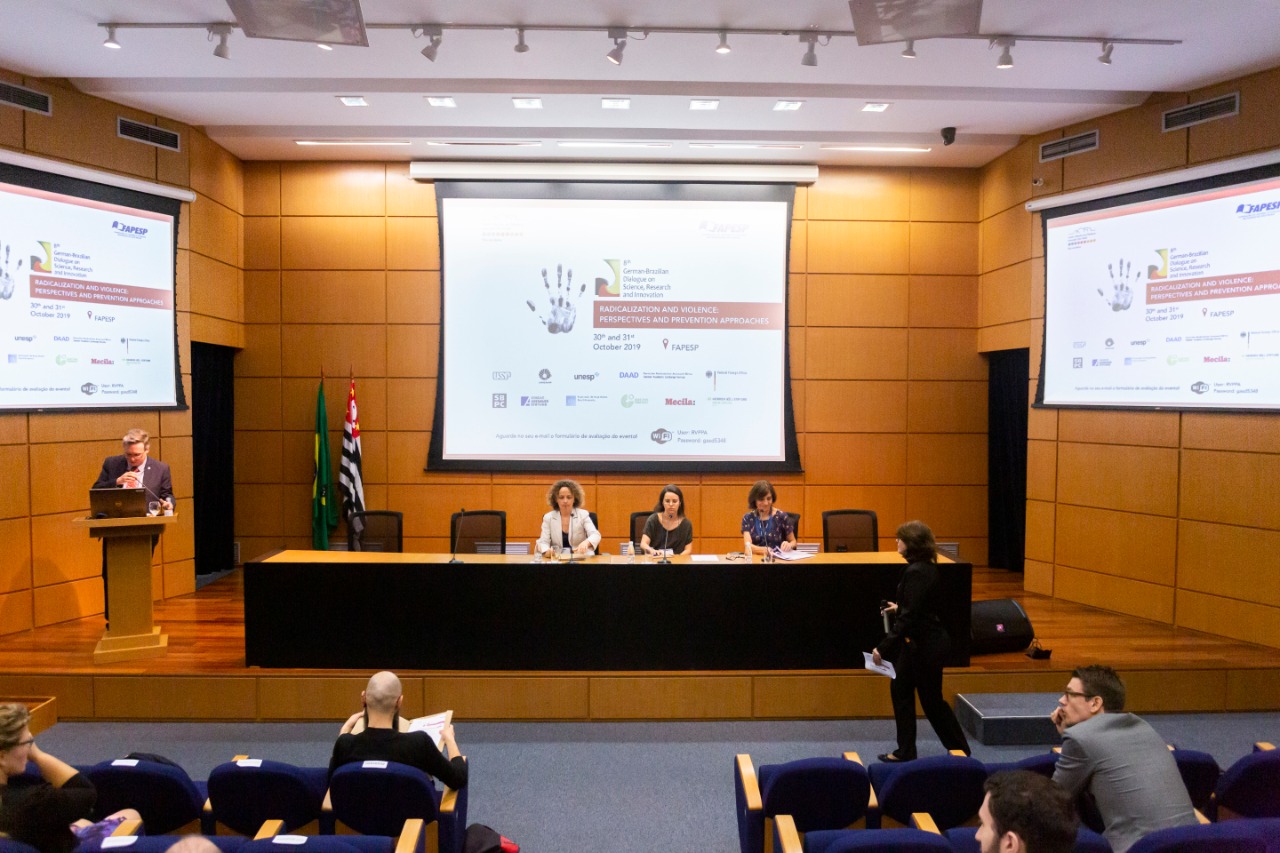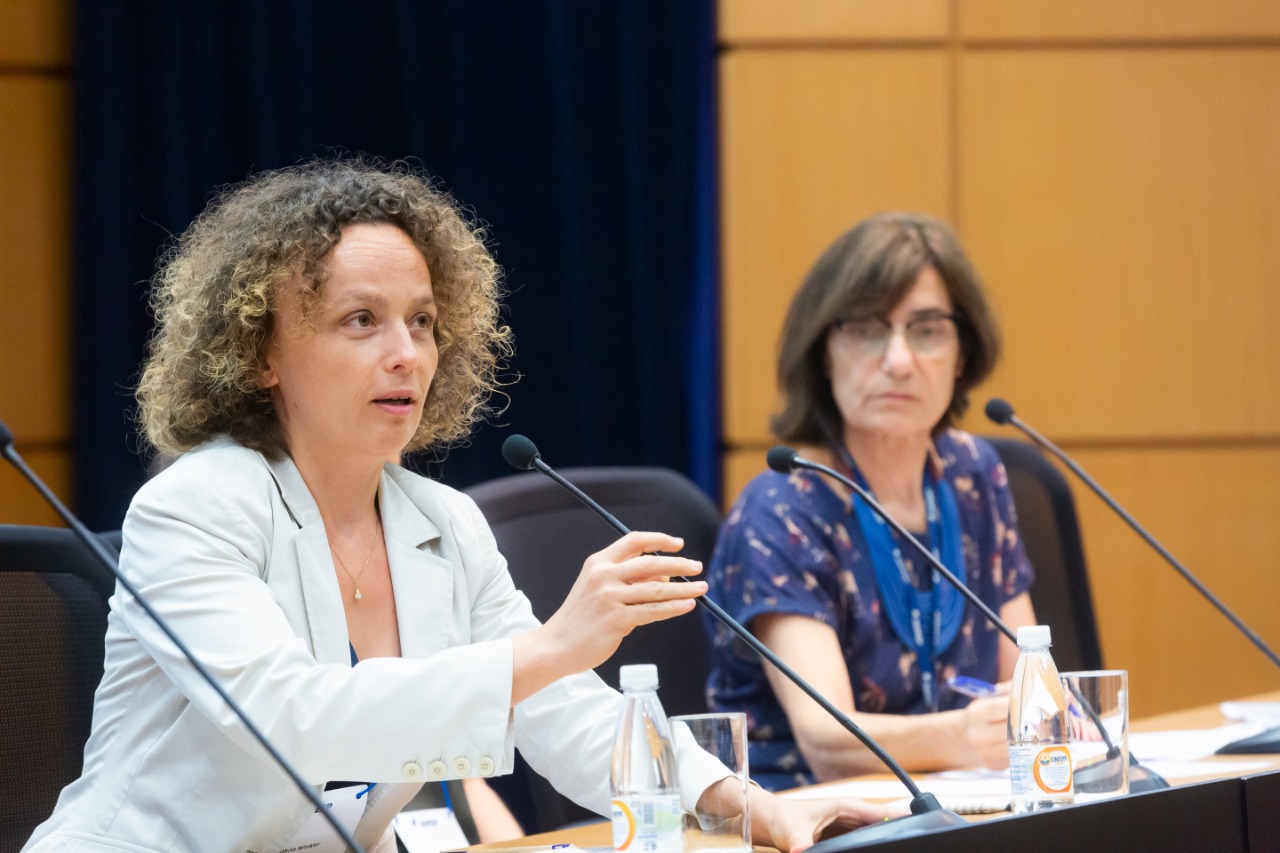8th German-Brazilian Dialogue: Cooperation in Conflict Research
Dialogue introduces sessions on funding opportunities for research visits and bilateral research cooperation
(28.11.19) The German-Brazilian Dialogue on Science, Research and Innovation, organised by the German House for Research and Innovation in São Paulo (DWIH São Paulo) and the funding organisation for the state of São Paulo (FAPESP), took place in São Paulo for the eighth time on 30 and 31 October 2019. This year's edition was based on the theme "Radicalization and Violence: Perspectives and Prevention Approaches". The growing violence, crises and radicalization processes around the world and the search for preventive measures were discussed over the course of two days.

Session on funding opportunities with representatives of the DFG, DAAD and FAPESP
© Felipe Mairowski
In addition to numerous speakers from Germany and Brazil, Dr. Julian Junk from the Peace Research Institute Frankfurt (HSFK), part of the Leibniz Association, and Prof. Dr. Thomas Fischer from the Catholic University of Eichstaett-Ingolstadt were invited as keynote speakers on the German side. Prof. Dr. Alba Zaluar from Rio de Janeiro State University (UERJ) and Prof. Dr. Lilia Schwarcz from the University of São Paulo (USP) were among those who presented the Brazilian standpoint.
The lectures were followed by short sessions on research funding opportunities on both days of the event. Project funding was discussed on the first day of the event and individual funding on the second day. Dr. Kathrin Winkler, Director of the DFG’s Latin America office, attended both sessions along with representatives of the German Academic Exchange Service (DAAD), the Alexander von Humboldt Foundation and the state funding organisation FAPESP, partner organisation of the DFG and host of this year's Dialogue. Winkler answered questions regarding the different programme lines within the DFG and FAPESP cooperation and individual modules that can be included in a DFG proposal. She placed special emphasis on the high level of flexibility that distinguishes FAPESP in its cooperation with the DFG. Even complex funding programmes such as the International Research Training Group (IRTG) have been successfully co-funded by the state institution. The FAPESP representatives highlighted the significance of such bilateral programmes for the internationalisation of research in the federal state of São Paulo.

Kathrin Winkler presents the international cooperation programmes
© Felipe Mairowski
Like the DFG, FAPESP promotes international cooperation in all its funding lines, for example by providing grants for visits abroad that funding recipients can apply for relatively easily. There are also special programmes that FAPESP offers as an incentive for international cooperation. For example, one of the keynote speakers at this year's Dialogue, Prof. Dr. Thomas Fischer, was successful in the application process in 2017 with his cooperation partner Prof. Dr. Gildo Magalhães Santos from the University of São Paulo (USP). As part of a joint call issued by BAYLAT and FAPESP, they received funding to hold two scientific workshops entitled "Bavaria and São Paulo: The origins of (natural) science, art and knowledge from the perspective of entangled history since the 19th century".
Such proposals for establishing scientific cooperation through workshops with Brazilian partners can also be submitted at any time on the basis of the cooperation between the DFG and FAPESP; this can be done through the Initiation of International Collaboration programme of the DFG. The strong point of the cooperation between the two funding organisations is that it provides funding opportunities to deepen the cooperation, building on the programmes aimed purely at mobility. As part of a DFG/FAPESP research grant, which can be applied for at any time, partners can work together on a research question for up to three years. If there are several researchers on both sides who would like to cooperate on complex issues on the basis of a well-consolidated partnership within a major association, several instruments from the group of the DFG/FAPESP Coordinated Programmes can be used. These include the DFG/FAPESP International Research Training Groups (IRTG) which focus on joint doctoral training between a group at a German university and a partner group in the federal state of São Paulo. The training is incorporated into a thematically focused research programme as well as a structured qualification programme, which are developed jointly and can be funded for up to nine years. The doctoral researchers work with a German and a Brazilian supervisor and complete a six- to twelve-month stay abroad at the respective partner institution.
- View Initiation of International Collaboration programm
- DFG/FAPESP Research Grant
- DFG/FAPESP Coordinated Programme
Other modalities of the DFG/FAPESP Coordinated Programmes include the DFG/FAPESP Research Units in which bilateral research projects can be carried out that go beyond the scope of the funding opportunities offered by the DFG/FAPESP Research Grants in terms of topic, time and financial resources. DFG/FAPESP Collaborative Research Centres are long-term research institutions of universities where researchers collaborate on a number of individual projects as part of an interdisciplinary research programme.
Further Information
A more detailed report on the 8th German-Brazilian Dialogue on Science, Research and Innovation is available on the website of the German House for Research and Innovation in São Paulo.